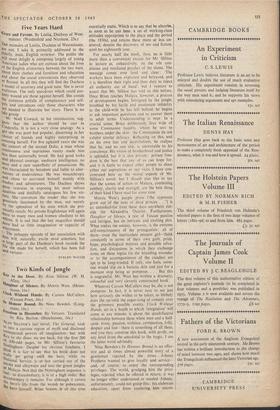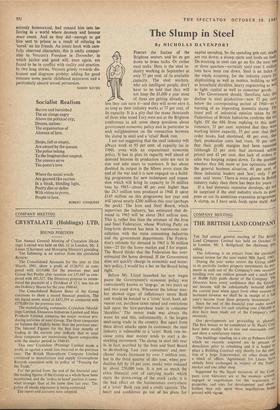Two Kinds of Jungle
'lock Without Hands. By Carson McCullers. (Cresset Press, 16s.) reedom in December. By Vercors. Translated by Rita Barisse. (Hutchinson, 16s.) ALAN SILLITOE'S last novel, The General, took us into a curious region of myth and disclosed Unsuspected powers of imagination; but with "Y to the Door we are back, for the first 200 of 450-odd pages, in Mr. Sillitoe's favourite Nottingham. Despite his obvious fondness, I think it is fair to say that his book does not r„eally get going until the hero, while on 'National Service, is at last carried out of the smoke and alleyways and into the green jungles °13f Malaya. Not that the Nottingham sequence is dad: as documentary, it is of a high order. But eumentary it remains. For although it covers ,e hero's life from the womb to pubescence, ule hero himself, Brian Seaton, is all this time
essentially static. Which is to say that he absorbs, as soon as be can hear, a set of working-class attitudes appropriate to the place and the period (the 1930s), and retains these more or less un- altered, despite the discovery of sex and fiction, until his eighteenth year.
For nearly half the book, then, he is little more than a convenient excuse for Mr Sillitoe to lecture us, exhaustively, on the vile con- ditions and mutilated psyches of the slums. The message comes over loud and clear: The workers have been exploited and betrayed, and it is therefore their right and their duty to reject all authority out of hand': but I venture to assert that Mr. Sillitoe has told us this before. Once Brian reaches Malaya, however, a process of development begins. 'Intrigued by the jungle, troubled by his facile and passionate infidelity to the child-wife he has left behind, he begins to ask important questions and to answer them in adult terms. Understanding is near. In a crucial scene, Brian deliberately fires wide of some Communist .bandits, whom he sees as brothers under the skin : the Communists do not exhibit similar delicacy. Reflecting on this, and on his own lust and deceitfulness, he realises that he. and no one else, is answerable to his conscience. His vision of brotherhood and justice is splendid, but it is also private: private free- dom is the best that any of us can hope for, and it is futile to expect other people to share either our aspirations or our vices. I have con- centrated here on the moral aspects of Mr. Sillitoe's novel; but I should also like to say that the scenes of action in Malaya, combining subtlety, clarity and strength, are the best thing of their kind I have read for some time.
Morris West's purple proSe ('the cypresses
grow out of the eyes of dead princes . . 'is an unlooked-for treat these days anywhere Out- side the Alexandria 'Quartet. Furthermore. Daughter of Silence, a tale of Tuscan passion and intrigue, has an intricate and exciting plot. What makes me uneasy. however, is the extreme self-consciousness of the protagonists: all of them—even the inarticulate peasant girl—think constantly in terms of their own guilt, pride, hope, psychological motives and possible salva- tion, and discussions in which they exchange notes on these topics (in the brooding noonday o' to the accompaniment of the cicadas) 'are apt to be long-winded. If only, one feels, some- one would slip on a banana skin and just for a moment stop being so pompous. . . . But this is ungrateful. Mr. West has written a dramatic, colourful and very cleverly constructed book.
Whatever Carson McCullers may be, she is not pompous. . In ,fact, it is never easy to see just how seriously she wishes to be taken, so blithely does she sprinkle the sugar-icing of comedy over the grimmest possible events. Clock Without Howls, set in a South to which `integration' will come at any minute, is about the quadrilateral relationship between, three white men and a half- caste. Irony, passion, violence, compassion, folly, despair and lust- —there is something of all these, and you may construe this book, with profit, on any level from the anecdotal to the tragic. I use the latter word advisedly.
Nina Bawden's In Honotir Bound is an effec- tive and at times almost powerful story, of a gentleman rejected by the times.. Johnny Prothero wanted to give loyalty and service— and, of course, to enjoy the corresponding privileges. The world, grudging him the privi- leges, rejected what he offered in return; it was no longer either understood or needed. Johnny, unfortunately, could not grasp this: his elaborate education, apart from rendering him uncon- sciously homosexual, had conned him into be. lieving in a world where decency and honour must count. And so they did—enough to get him sent to prison as a result of refusing to `sneak' on his friends. An ironic book with care- fully observed characters, this is oddly compar- able to Vercors's Freedom in December, in which justice and good will, once again, are found to be in conflict with reality and practice. In two long stories, Vercors grimly rewards dis- honour and disgraces probity; adding for good measure some poetic childhood sequences and a particularly absurd sexual perversion.
SIMON RAVEN







































 Previous page
Previous page